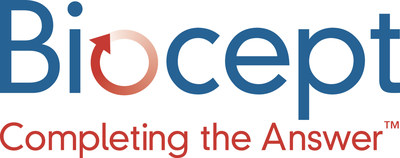SAN DIEGO, Dec. 7, 2015 /PRNewswire/ -- Biocept, Inc. (NASDAQ: BIOC), a molecular diagnostics company commercializing and developing blood-based liquid biopsies to improve the detection and treatment of cancer, announces a collaboration with Baylor College of Medicine to develop minimally invasive blood-based tests using Biocept's circulating tumor cell (CTC) and circulating tumor DNA (ctDNA) molecular diagnostic assay platforms to detect mutations in the estrogen receptor gene (ESR1).

Clinical studies have shown that endocrine therapy treatment can significantly reduce breast cancer-related mortality for patients with estrogen receptor (ER) positive breast cancers. However, nearly one-third of women treated with Tamoxifen and other endocrine therapies become resistant to these therapies. Recent studies utilizing next-generation sequencing on estrogen receptor-positive, metastatic patient samples indicate that recurrent ESR1 mutations, which may play an important role in acquired endocrine therapy resistance, are far more frequent than previously thought. As a results, ESR1 mutations are becoming important biomarker targets as an indicator for therapy resistance and could serve as a companion diagnostic to cancer therapeutics currently in development that address this acquired form of resistance.
"Biocept's unique technology is incredibility sensitive and specific, and its dual approach using both CTCs and ctDNA to detect biomarker mutations could provide the most complete assessment of each patient's cancer in this sample type," said Suzanne Fuqua, Ph.D., Professor of Medicine at Baylor College of Medicine. "I look forward to working with Biocept in our quest to determine the role of specific mutations in ER alpha, specifically K303R and Y537N Era alterations, and their relationship to hormone resistance. Monitoring during hormone therapy is gaining added importance due to recently presented data that indicates that these mutations can potentially predict future clinical relapse. This suggests that we may improve our ability to tailor individual therapies for ER-positive patients in the near future."
Surgical tumor biopsies are typically used to evaluate the presence of ESR1 mutations. However, these invasive surgical procedures are not always practical for monitoring as they can add risk and are sometimes not possible due to the patient's health. Additionally, tissue biopsy may not be sufficient to detect these mutations due to tumor heterogeneity or differences in the tumor's makeup that may not be detected by a single tissue sample.
"Reducing the number of invasive and expensive surgical biopsy procedures for patients with breast cancer is a core focus at Biocept," said Michael W. Nall, President and CEO of Biocept. "Our blood-based approach could also overcome the limitation of tumor heterogeneity associated with tissue biopsies through the ability to capture a more complete look at the tumor's overall makeup. We are excited about working with Dr. Fuqua, who pioneered the discovery of alternatively spliced transcriptional isoforms and somatic mutations in breast tumors, and with our new collaboration with Baylor College of Medicine to develop the molecular assays to detect these mutations in patient's blood."
About Biocept
Biocept, Inc. is a commercial-stage molecular diagnostics company that utilizes a proprietary technology platform and a standard blood sample to provide physicians with important prognostic and predictive information to enhance individual treatment of patients with cancer. Biocept's patented technology platform captures and analyzes circulating tumor DNA, both in CTCs and in plasma (ctDNA). Biocept currently offers assays for gastric cancer, breast cancer, lung cancer, colorectal cancer and melanoma, and plans to introduce CLIA-validated assays for prostate cancer and other solid tumors in the near term. For additional information, please visit www.biocept.com.
Forward-Looking Statements Disclaimer Statement
This release contains forward-looking statements that are based upon current expectations or beliefs, as well as a number of assumptions about future events. Although we believe that the expectations reflected in the forward-looking statements and the assumptions upon which they are based are reasonable, we can give no assurance that such expectations and assumptions will prove to have been correct. Forward-looking statements are generally identifiable by the use of words like "may," "will," "should," "could," "expect," "anticipate," "estimate," "believe," "intend," or "project" or the negative of these words or other variations on these words or comparable terminology. To the extent that statements in this release are not strictly historical, including without limitation statements as to our ability to improve the detection and treatment of cancer, our ability to develop minimally invasive blood-based tests to detect mutation in the ESR1, the role of ESR1 in endocrine therapy resistance and its ability to serve as a companion diagnostic to cancer therapeutics, physicians' use of our technology to personalize the treatment of patients with cancer, market acceptance of liquid biopsy, and our ability to expand into new cancer indications and grow our portfolio of biomarker assays, such statements are forward-looking, and are made pursuant to the safe harbor provisions of the Private Securities Litigation Reform Act of 1995. The reader is cautioned not to put undue reliance on these forward-looking statements, as these statements are subject to numerous risk factors as set forth in our Securities and Exchange Commission (SEC) filings. The effects of such risks and uncertainties could cause actual results to differ materially from the forward-looking statements contained in this release. We do not plan to update any such forward-looking statements and expressly disclaim any duty to update the information contained in this press release except as required by law. Readers are advised to review our filings with the SEC, which can be accessed over the Internet at the SEC's website located at www.sec.gov.
Logo - http://photos.prnewswire.com/prnh/20151013/276540LOGO
To view the original version on PR Newswire, visit:http://www.prnewswire.com/news-releases/biocept-announces-collaboration-with-baylor-college-of-medicine-to-develop-liquid-biopsy-tests-for-estrogen-receptor-gene-300188391.html
SOURCE Biocept, Inc.





